- Home
- Hunter S. Thompson
Proud Highway
Proud Highway Read online
“ONE OF THE GREATEST AMERICAN WRITERS OF THE 20TH CENTURY,
both for his vibrant prose style and his career-long autopsy on the death of the American dream.”
—San Francisco Examiner
“Extraordinary. Thompson was burning with a lovely light that seared these letters with wit, wonder, and insight These letters could serve as mileposts along the way of where we’ve been and where we are”
—Atlanta Journal & Constitution
“A careening, chaotic, rollercoaster ride through time Crackling electrical charged fused from the Fires of Hell Direction Purpose Energy.”
—William S. Burroughs
“Another insightful masterpiece from the finest southern gentleman since Colonel Harland Sanders. Read these letters, but do not, under any circumstances, give this man your number.”
—Johnny Depp
“HST takes the air out of airmail and replaces it with pure, compressed, explosive hydrogen (plus laughing gas). You’ve never gotten any letters like these—unless you’re Abelard and Heloise, in which case you’re castrated and dead.”
P.J O’Rourke
“Some of the finest political and social writing of our times.”
—The Seattle Times
“Astonishing … We get overdosed with surprises.”
—Newsweek
“SCATHING, OBSCENE, INSIGHTFUL AND PRETTY DARNED FUNNY”
—The Memphis Commercial Appeal
“Perhaps the most honest writer we have. His letters make clear that he doesn’t lie—he simply tells outsized truths that most people are so used to screening out that we have to laugh or shrug them off as exaggeration.”
—Time Out
“Hunter S. Thompson again proves himself a great American writer … The Proud Highway is something of an adventure story, the tale of a man who insisted, in the early ’60s, that it was still feasible to drink unto blindness, jump smugglers’ boats and, indeed, move from ‘home’ to ‘home’ with the frequency of a Mayflower truck.”
—The Virginian Pilot
“Fast, furious, loaded with incident, and utterly fearless [Thompson] may be the best letter writer since Flaubert.”
—Men’s Journal
“Lurking beneath the aggressive energy and ferocious will that powers these letters is a wistful, doom-haunted melancholy that finds its true release not in rage and excess, but in the act of writing.”
—Newsday
“Bracing, often hilarious epistles.”
—New Orleans Times-Picayune
“Fear and Loathing, aphorism and malediction, mischief and indigence, fill this galvanically gonzo collection of Thompson’s early letters.”
—Kirkus Reviews
“Peerless in its outrageousness … By turns exasperating and entertaining, this is also a devastating portrait of the writer as an incorrigible outsider.”
—Publishers Weekly
“A MASSIVE AND ENLIGHTENING WORK,
a savage and highly personal history of the late 1960s that will remind readers that Hunter Thompson is a twisted American treasure.”
—The Orlando Sentinel
“Irresistible … The letters and other fragments in this collection are invested with the same rugged, outspoken individualism as his more public writings, which makes them just as difficult to put down.”
—Richard Berstem
The New York Times
“This is a surprising and entertaining book, simply for what it claims to be the electrified musings of a young man, starving and wild, determined to succeed as a writer.”
—Austin American-Statesman
“These Thompsonesque burlesques are hilariously splenetic, shocking and frequently insightful.”
—Lexington Kentucky Herald-Leader
“A shot in the liver for struggling writers and a searing testimony to an important moment in American journalism. Highly recommended.”
—Library Journal
“Vastly entertaining and a crash course in good writing … an amazingly good read and a reminder that behind the image lies a tremendous talent.”
—Boulder Planet
“Roaring at perceived injustice … This is the story that Hunter S. Thompson fans would never get from Doctor Thompson himself if he sat down to write an autobiography: loyalty, insanity, angst, altruism, and even streaks of tenderness.”
—Houston Chronicle
“The Proud Highway gives Thompson fans a fresh dose of the past. Here is the old Harley hog of a writer revving up, firing on all cylinders and riding away into the sunset.”
—News & Record (Greensboro, NC)
“BRILLIANT BEYOND DESCRIPTION.”
—Rolling Stone
“Thompson wrote great, entertaining letters even when he was apologizing for his behavior or haggling with editors over money.”
—The Arizona Republic
“Monumental … Thompson conveys his sense of purpose with equal measures of fire and clarity, reminding us that, all myths aside, Thompson’s literary prowess is real.”
—Louisville Courier Journal
“Razor sharp and relevant today.”
—The Denver Post
“Through his letters you see the path he took to becoming the god of ‘gonzo journalism’ ”
—Kansas City Star
“Vintage Thompson, alive with vicious wit, brutal comic savagery, and vitality … Strongly recommended.”
—Express Books (Berkeley, CA)
“Rabidly funny.”
—Mirabella
A Ballantine Book
Published by The Random House Publishing Group
Copyright © 1997 by Hunter S. Thompson
All rights reserved
Published in the United States by Ballantine Books, an imprint of The Random House Publishing Group, a division of Random House, Inc, New York and simultaneously in Canada by Random House of Canada Limited, Toronto
Grateful acknowledgment is made to the following for permission to reprint previously published material
LIVERIGHT PUBLISHING CORPORATION Excerpt from “A Poet’s Advice to Students” from A Miscellany Revised by E E Cummings edited by George J Firmage Copyright © 1955, 1965 by the Trustees for the E E Cummings Trust Copyright © 1958 1965 by George J Firmage Reprinted by permission of Liveright Publishing Company
The Nation “The Nonstudent Left by Hunter S. Thompson (The Nation, September 27, 1965) Copyright © 1965 by The Nation Reprinted by permission of The Nation magazine
SPECIAL RIDER MUSIC Excerpt from “Ballad of a Thin Man” by Bob Dylan Copyright © 1965 by Warner Bros Inc Copyright renewed 1993 by Special Rider Music Reprinted by permission of Special Rider Music
Ballantine and colophon are registered trademarks of Random House, Inc.
www.ballantinebooks.com
Library of Congress Catalog Card Number 97-94231
eISBN: 978-0-307-82662-6
This edition published by arrangement with Villard Books a division of Random House Inc Villard Books is a registered trademark of Random House Inc.
v3.1
Arms, my only ornament—my only rest, the fight
—Cervantes, Don Quixote
CONTENTS
Cover
Title Page
Copyright
Epigraph
Foreword: The Curse of the Bronze Plaque
by William J. Kennedy
Editor’s Note by Douglas Brinkley
Author’s Note by Hunter S. Thompson
1955
Louisville in the Fifties … Sloe Gin, Sleazy Debutantes, and the Good Life in Cherokee Park … From Athenaeum Hill to the Jefferson County Jail … Welcome to the Proud Highway …
1956
Year of the Mo
nkey … Uncle Sam Wants You … Birth of a Sportswriter … A Negro Vision of Hell … Welcome to Fat City … Doomed Love in Tallahassee …
1957
Beating the System … Triumph of the Wild Boy … Mencken Revisited … The Louisville Connection … The Lessons of Hemingway … The Shock of Recognition … Nightmare in Jersey Shore …
1958
Down and Out in Manhattan … No Room at the YMCA … Life at the Interracial Hotel … Midnight Sins of HST … Feeding Off Henry Luce … Whose Movie Is This?…
1959
Prince Jellyfish Goes to the Catskills … Fired from the Middletown Daily Record … Sowing the Seeds of a Strange and Fatal Compulsion … Don Quixote Flees to Puerto Rico …
1960
New Life in the Tropics … Naked, Crazy, and Rich on Luquillo Beach … The Bowling Disaster, the Beating, the Beauty, and the New York Herald Tribune … Escape from Puerto Rico, Deported from Bermuda … Long Run to San Francisco, Long Chain of Failure … Bad News for the Swine Family …
1961
Hard Traveler Comes to Big Sur … Great Leaps of a Free-lance Writer … $780 a Year … The South Coast Is a Wild Coast and Lonely … The Secret Passions of Joan Baez Killing Pigs and Selling Dogs …
1962
Fuck You, I Quit … The Artist Flees to the Andes … Whiskey with Indians, Champagne with Bobby Kennedy … In Aruba with $30 … Desperate Days with Smugglers … Eight Days on a Beer Barge … Democracy Dies in Peru, Checks Bounce in La Paz … The King of Copacabana Beach …
1963
Dow Jones’s Man in Rio … Power Broker for the Peace Corps … Triumph of a Foreign Correspondent … Counsel for The Washington Post … Back to the USA, Honored Guest of the National Press Club … Going West, Riding High … Book Reviews for Beer & Bullets … The Dirtiest Hour of Our Time: November 22, 1963 … The Death of Hope …
1964
The Jack London Period: Moving West, Moving Constantly … Denver, Aspen, Ely, Butte, Glen Ellen, Ketchum, Big Sur, San Francisco … Letters to LBJ … Naked and Alone on U.S. 50 … Flight to California: Welcome to the Grapes of Wrath …
1965
San Francisco in the Weird Years … Plunged into Poverty, Rammed Through the Looking Glass … From The Wall Street Journal to Drug Riots, Hell’s Angels, Free Speech, Ken Kesey, Total Violence, Tom Wolfe, LSD 25, and the Elegant Madness of Allen Ginsberg …
1966
318 Parnassus … Abandon All Hope Ye Who Enter Here … Saved by Charles Kuralt … Falling in Love with a 650 Lightning … Armed and Drunk on Highway 101 … Stomped by Greedy Angels … Famous Writer Flees Ronald Reagan … From the Shit House to Random House …
1967
Triumph of the Will … Whooping It Up in the Plaza Fountain … Naked and Alone on the Celebrity Circuit … Hero of The New York Times … Saved by Studs Terkel … Swarmed Over by Parasites … Fuck You, You’re Fired … The First Victory Lap …
Epilogue: “Midnight on the Coast Highway”
The Proud Highway Honor Roll
Chronological List of Letters
Dedication
Other Books by This Author
About the Author
About the Editor
THE CURSE OF THE BRONZE PLAQUE
A Foreword to the Letters of Hunter Thompson
BY WILLIAM J. KENNEDY
An institution that should always fight for progress and reform, never tolerate injustice or corruption, always fight demagogues of all parties, never belong to any party, always oppose privileged classes and public plunderers, never lack sympathy with the poor, always remain devoted to the public welfare, never be satisfied with merely printing news, always be drastically independent, never be afraid to attack wrong, whether by predatory plutocracy or predatory poverty.
—Joseph Pulitzer, May 10, 1883, in an editorial upon becoming publisher of the New York World (reproduced on a bronze plaque on the Times Tower, New York City)
It was late summer, 1959. Hunter Thompson had kicked in the candy machine at the Middletown (New York) Daily Record, had been fired for being “too offbeat,” and was looking for work. He answered an ad in Editor & Publisher for a sports editor’s job at the brand-new daily San Juan Star. He was twenty-two but represented himself as twenty-four. He said the job interested him because it was in Puerto Rico, outside the “great rotarian democracy” of the mainland.
He mentioned his Middletown troubles and also said he was lecturing on the meaning of the Beat Generation. “I have given up on American journalism,” he wrote “The decline of the American press has long been obvious, and my time is too valuable to waste in an effort to supply the ‘man in the street’ with his daily quota of clichés … There is another concept of journalism.… It’s engraved on a bronze plaque on the southeast corner of Times Iower in New York City.” He added that he now had to get back to his novel, part of which was with the Viking Press in New York.
As managing editor of the fledgling Star, I wrote him explaining that our editor1 was a member of Rotary, that we had a staff of offbeat reporters (and editors) who, like him, were writing fiction, and suggested he return to his novel, or perhaps start another, building his plot around the bronze plaque on the Times Tower. “You should always write about something you know intimately,” I wrote, and added that if we ever got a candy machine and needed someone to kick it in we’d be in touch.
He received my letter at his home in Louisville in the same mail that brought Viking’s rejection of his novel, and he sat down and wrote me, “your letter was cute, my friend, and your interpretation of my letter was beautifully typical of the cretin-intellect responsible for the dry-rot of the american press but don’t think that lack of an invitation from you will keep me from getting down that way, and when I do remind me to first kick your teeth in and then jam a bronze plaque far into your small intestine.”
I wrote back, saying that since he was the bushy-tailed expert on journalism’s dry rot, we would pay him space rates to summarize its failings in three double-spaced pages that we would run in our first edition, along with our exchange of correspondence. I said I didn’t know another publication that would give him the time of day, and signed it “Intestinally yours.”
His reply: “Daddio! You mean the bronze plaque paragraph bugged you?… I don’t mind saying, friend Kennedy, that I enjoyed your letter. This is a weird bit of correspondence we have here, my man” But he said I was a tragic optimist if I thought it was possible to handle the dry rot in three pages and he assumed my offer was designed to develop “a ceremonial mangling … of a jabbering beatnik.” Even so, he said he would give it a fling, which he did.
“Dear Hack,” he wrote, enclosing with his letter a one-act play: “a brutal, low-level, sledge-hammer drama … a farce, of course, but its theme is a big one.” He also said my last letter had surprised him, “and perhaps in the long run I shall owe you an apology for all this abuse.”
I rejected his play as “warmed-over clichés with barnyard overtones,” and wished him well with his book, noting he’d be better off away from journalism if he was serious about the novel, and suggesting he stop by for a drink if he was in the neighborhood.
He responded with a page of revenge. “Don’t expect me to send you a package of platitudes to drape over the stinking carcass of your newspaper like an American flag over a coffin full of crap.” He added: “I imagine you’re pretty decent, in your own way, and I think it’s a shame that you’ve hired yourself out as a mouthpiece for the international rotary.”
Less than two months later he had applied to Sportivo, a new bowling magazine in San Juan. “I may have a chance of duping [the editor] into thinking I’m normal,” he wrote his friend Bob Bone, a reporter on the Star, and he got the job. But pretending to be normal was folly Sportivo’s editor proved to be, in Hunter’s words, “a liar, cheat, passer of bad checks, welshing shyster, and otherwise foul,’ and the job merely led to new insolvency.
But here was Hunter in San Juan, and
before long he came to the Star’s city room Fred Harmon, our business editor, greeted him, “We don’t have a candy machine, but there’s a cigarette machine in the corner.” A few of us went out for that promised drink, talked of bronze plaques and novels, and Hunter settled in for several months of life in Puerto Rico.
He was kicked out of two houses, but eventually found one on a deserted beach, brought down his wife-to-be, Sandy (“I can barely support myself, much less a common-law wife,” he wrote her, “so I presume you’ll bring at least a little money for food”), wrote some fiction, did free-lance journalism, and we had a number of all night conversations about writing, and how and why you do it.
By June, Hunter was abysmally broke, had been beaten by police and jailed for breach of the peace and resisting arrest, was reduced to drinking rainwater and being eaten by sand fleas, and, sensing also that he might have to spend a year in a Puerto Rican jail, he fled the Caribbean in a sailboat.
He wrote me from Bermuda. “Dear Editor. My name is HS Thompson and I would like to work for the San Juan Star.… I understand Puerto Rico is a wonderful place to live.… My information comes from three fellows I met in an asylum in upstate New York.… They were good fellows and I could understand most of what they said.”
This was an unlikely beginning to a friendship and correspondence of, so far, thirty-seven years’ duration. But odd things occur when you intersect with Hunter Thompson. Life happens to him in ways alien to most mortals. In the exchange of letters cited above (fully rendered in the pages that follow) there lurks prophecy—of Hunter’s future as a masterful American prose stylist and journalistic fictionist, and also of the lifestyle that has served him so well creating chaos to undercut his own most cherished schemes, courting self-destruction as the avenue to success, maintaining a symbiotic colloquy with comic despair, and coping with bronze plaquery and other rejection through Avenger’s Rhetoric, e.g., from 1965 to a dilatory editor: “I’m coming to New York on a chopped hog and shoot you in the gut with an expanding filth flare”, from 1967 on his plans for chastising a literary agent: “cracking his teeth with a knotty stick and rupturing every other bone and organ I can make contact with in the short time I expect will be allotted to me.”

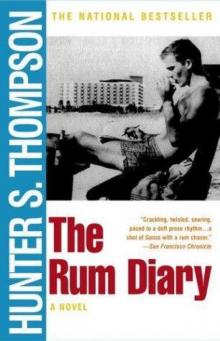 The Rum Diary
The Rum Diary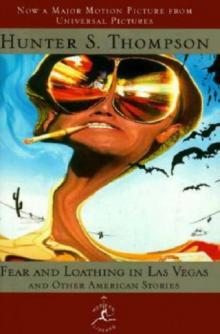 Fear and Loathing in Las Vegas and Other American Stories
Fear and Loathing in Las Vegas and Other American Stories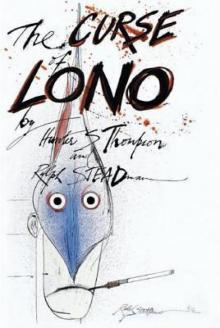 The Curse of Lono
The Curse of Lono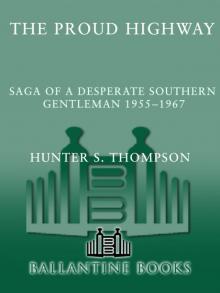 Proud Highway: Saga of a Desperate Southern Gentleman, 1955-1967
Proud Highway: Saga of a Desperate Southern Gentleman, 1955-1967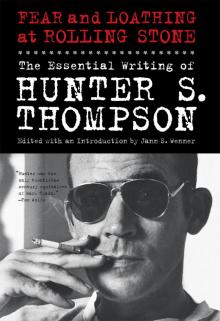 Fear and Loathing at Rolling Stone: The Essential Hunter S. Thompson
Fear and Loathing at Rolling Stone: The Essential Hunter S. Thompson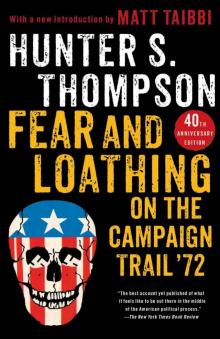 Fear and Loathing on the Campaign Trail '72
Fear and Loathing on the Campaign Trail '72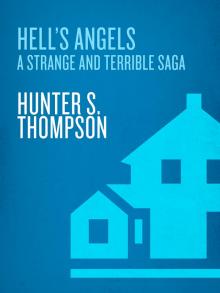 Hell's Angels: A Strange and Terrible Saga
Hell's Angels: A Strange and Terrible Saga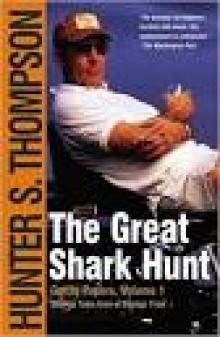 The Great Shark Hunt: Strange Tales From a Strange Time
The Great Shark Hunt: Strange Tales From a Strange Time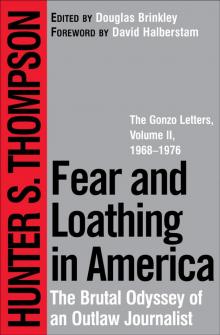 Fear and Loathing in America
Fear and Loathing in America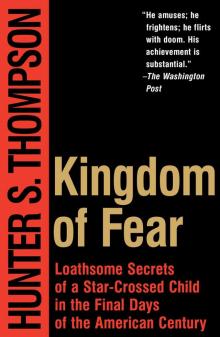 Kingdom of Fear
Kingdom of Fear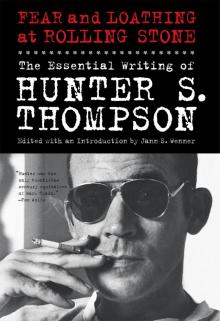 Fear and Loathing at Rolling Stone
Fear and Loathing at Rolling Stone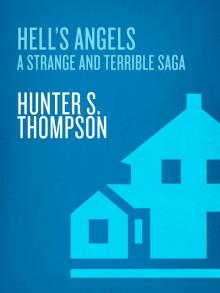 Hell's Angels
Hell's Angels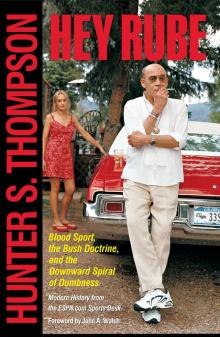 Hey Rube
Hey Rube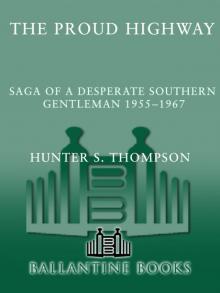 Proud Highway
Proud Highway